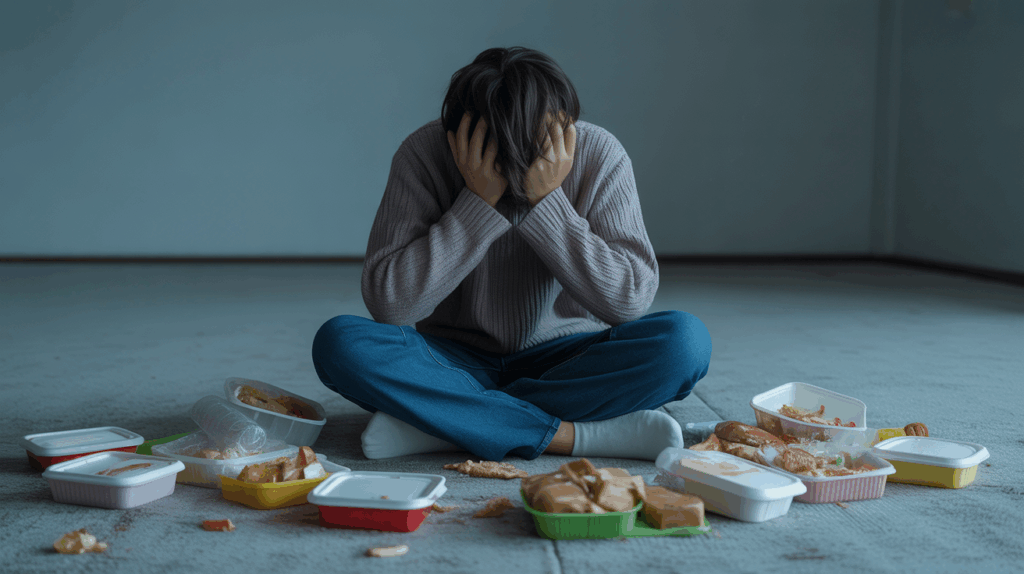OCD and Binge Eating
Understanding OCD and Binge Eating
Obsessive-compulsive disorder (OCD) is a mental disorder marked by intrusive thought patterns and repetitive behaviors. Binge eating disorder involves compulsive eating beyond normal appetite. When combined, these conditions can intensify distress and reduce quality of life.

Both OCD and binge eating are listed in the Diagnostic and Statistical Manual of Mental Disorders (DSM-5). Research shows strong links between compulsive behavior, impulsivity, and disordered eating patterns. Patients often experience guilt, shame, and fear after an episode of compulsive overeating.
Prevalence and Comorbidity
The prevalence of binge eating disorder is higher in patients with OCD compared to the general population. Comorbidity with anxiety disorder, depression, and body dysmorphic disorder is also common. This overlap can worsen weight gain, obesity, and mental health challenges.
Studies in psychology and neuroscience suggest that the caudate nucleus and prefrontal cortex of the brain play roles in inhibitory control and decision-making. Disruption in these regions may increase compulsive eating behaviors.
The Role of Anxiety and Stress
Anxiety is a core symptom in both OCD and eating disorders. Stress can trigger compulsive behaviors, leading to patterns of bingeing or ritualistic hand washing. Emotional eating often starts when stress levels rise, reinforcing an unhealthy habit.
Without stress management strategies, these cycles worsen over time. Patients may turn to alcohol, drug misuse, or substance abuse as maladaptive coping methods. This adds further risk for addiction and long-term health issues.

Body Image and Emotional Distress
Body image perception strongly influences eating habits. Advertising and media content can reinforce unhealthy ideals about diet, fat, and weight. For some patients, perfectionism and body dissatisfaction fuel compulsive overeating.

Feelings of guilt, shame, and distress often follow binge episodes. This emotional eating cycle can trigger more overeating, reinforcing the pattern. Body mass index (BMI) may increase, raising risk for hypertension, diabetes, and other diseases.
How the Brain and Neurotransmitters Play a Role
Neuroscience research highlights how dopamine and serotonin affect compulsive eating and OCD. Food craving, carbohydrate intake, and sugar consumption stimulate the reward system, affecting mood and cognition. Diet and Nutrition in Managing OCD.
Imbalances in neurotransmitters can influence appetite, desire, and compulsive behavior. Evidence shows that serotonin levels are tied to both depression and eating disorders, while dopamine affects attention, motivation, and impulsivity.
Diagnosis and Pathology
Diagnosis of OCD and binge eating requires assessment from a mental health professional. Physicians and psychiatrists evaluate symptoms using structured interviews and evidence-based tools. Pathology involves looking at behaviors, thought patterns, and comorbidity.
Patients may present with overlapping conditions like trichotillomania or attention deficit hyperactivity disorder (ADHD). Health care providers consider history, medication use such as antidepressants, and possible relapse patterns when creating a treatment plan.
Other Causes of Binge Eating
Binge eating does not always stem from OCD. For some patients, environmental triggers such as childhood neglect, trauma, or learned behaviors in the home can lead to compulsive eating. Emotional distress, depression, and loneliness may also start the cycle.
Diet culture and repeated attempts at strict dieting can also increase risk. Restrictive food rules heighten appetite, leading to overeating once control breaks. This creates a pattern of guilt, shame, and relapse that mirrors addiction-like behaviors.
Other Things OCD Can Cause
OCD extends beyond eating and food concerns. Patients may develop compulsions such as hand washing, checking behaviors, or counting rituals. These repetitive behaviors stem from intrusive thought patterns and the desire to reduce fear or anxiety.
OCD can also contribute to body dysmorphic disorder, compulsive cleaning, and hoarding. Each behavior affects daily functioning, reduces quality of life, and can increase risk of comorbid conditions like depression or substance abuse.
Therapy and Treatment Options
Therapy is central to treatment. Cognitive-behavioral therapy and dialectical behavior therapy (DBT) are effective in addressing compulsive overeating, anxiety, and OCD behaviors. DBT focuses on distress tolerance, impulse control, and emotional regulation.
Working with a dietitian or nutritionist can support healthier meal planning and weight management. Structured diets, exercise, and nutrition education reduce overeating and improve body image. Patients also benefit from support groups and community programs that enhance accessibility to care.
Non-Medication Options
Non-medication options are essential for patients who prefer therapy-based or holistic strategies. Stress management, mindfulness practices, and relaxation exercises reduce the intensity of food cravings and obsessive thoughts. Exercise also improves mood and supports weight management.
Behavioral interventions such as exposure therapy, meal planning, and habit tracking can reshape patterns. Patients may also use internet-based programs or community support groups that increase accountability and motivation. These non-medication paths support long-term recovery.
Role of Medication in Treatment
Medication may support therapy when OCD and binge eating symptoms are severe. Physicians may prescribe antidepressants that influence serotonin or dopamine levels. These drugs help regulate mood, reduce compulsive thoughts, and stabilize appetite.
Some patients misuse stimulant or laxative substances in attempts at weight loss. This can worsen pathology, increase health risks, and lead to relapse. Close monitoring by a psychiatrist ensures safe and effective treatment.
The Importance of Nutrition and Exercise
Balanced nutrition and regular exercise support weight management and reduce emotional eating. Carbohydrate balance, sugar reduction, and structured meal planning improve appetite regulation. Exercise also boosts dopamine and serotonin, improving mood.
Nutritionists often design diets that meet patient needs without triggering restrictive or binge behaviors. Patients working with dietitians gain confidence in eating patterns that enhance health and reduce obesity risk.
The Impact of Advertising and Media
Advertising strongly affects body image perception. Internet and social media platforms promote unrealistic standards that fuel perfectionism and disordered eating. Repeated exposure to such content increases dissatisfaction, stress, and compulsive eating.
Communities must raise awareness about healthier perceptions of weight, diet, and health. Patients benefit from education that promotes understanding and reduces stigma about mental disorders.
Relapse and Long-Term Recovery
Relapse is common in both OCD and binge eating disorders. Triggers may include stress, negative emotions, or changes in weight. Patients may fall back into compulsive eating or obsessive rituals when under pressure.
Recovery requires ongoing therapy, consistent stress management, and healthy coping behaviors. Motivation, community support, and accessible health care services all play roles in helping patients stay recovered.

How Revival Mental Health Can Help
At Revival Mental Health, we provide evidence-based treatment for OCD and binge eating. Our clinicians focus on therapy approaches like dialectical behavior therapy to target compulsive behavior, emotional regulation, and stress management. Patients also work with nutrition professionals to support healthy eating.
We accept insurance to make treatment more accessible. Our programs help patients overcome shame, improve quality of life, and reduce relapse risk. By addressing both mental health and physical health, we create lasting pathways for recovery.
Final Thoughts
OCD and binge eating share strong connections through compulsive behavior, stress, and emotional eating. Without treatment, both disorders can worsen health, increase obesity risk, and reduce quality of life.
Recovery is possible with therapy, nutrition support, and healthy coping strategies. With the right care, patients can improve mental health, regulate eating habits, and build confidence in daily life.
FAQs
1. Is binge eating always linked to OCD? No, binge eating is not always connected to OCD. Some patients binge eat due to emotional eating, stress, or depression without showing OCD symptoms.
2. Can nutrition counseling alone stop binge eating? Nutrition counseling helps, but therapy is often needed too. A dietitian or nutritionist can support balanced eating, but psychological treatment addresses underlying compulsions.
3. Do antidepressants help with binge eating? Antidepressants can reduce compulsive thoughts and regulate mood. They are often used alongside therapy for patients with binge eating and OCD symptoms.
4. What is the first step if I suspect OCD and binge eating? The first step is to seek help from a physician or mental health professional. Diagnosis guides treatment with therapy, nutrition planning, and possible medication.





